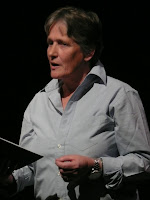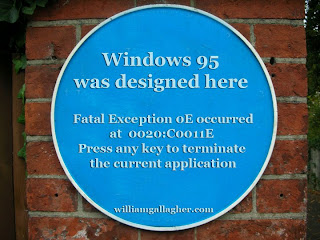Hello, I’m Flavour O’Themonth, the roguishly handsome runner-up from Strictly Come Dancing who is a real man’s man as well as appealing to a broad demographic of women with my casual but highly made-up stubble and these blue eyes. So very blue. Look at them. Look at me. Don’t listen.
I want to find out why all modern documentaries are more about their presenters than their subjects. Join me on my personal journey. It’s a journey that will shock you. It’s a startling story that starts right here, just about one extension lead’s distance from a TV studio.
And it’s a story that will end by changing the face of documentaries forever.
The truths you and I will uncover tonight are going to shake the entire world, though obviously they won’t make a difference to anything or get a pixel’s worth of coverage on the TV news.
But they will shock enough to get us a feature in Radio Times and tomorrow there’ll be a nasty feature and extensive photo gallery of me in the Daily Mail by a writer who didn’t watch either but needs my celebrity name to drive traffic to his website.
[SOFT MUSIC: CURRENT BOYBAND BALLAD]
When I was a little boy, things were a lot simpler. BBC showed documentaries like Jonathan Miller’s The Body in Question. Dr Jonathan Miller took us around the world but he also just talked to us. Lectured, really. Huge long sequences that – [QUICK: THEY’RE LOSING ATTENTION: SHOW A RUBIK’S CUBE] – just had him telling us things we didn’t know. Crazy.
And yet, demonstrating how I’m intelligent but in a non-threatening way, I watched that show agog, completely lost in it and even for a brief while forgetting the Rubik’s Cube I had in my hand.
INT. YE OLDE 1990S TEENAGE BEDROOM – NIGHT
Caption: “Reconstruction”
FLAVOUR O’THEMONTH (15) watches a 1950s-era TV set showing a copyright-free clip of someone who looks a bit like Jonathan Miller. Flavour drops his Rubik’s Cube.
And I here I am, the impossibly handsome adult, catching that very same Rubik’s Cube as it falls from nowhere in particular but looks fantastic in slow-mo.
Coming up, I’m going to find out how Rubik’s Cubes were made and look at why they were so important to me. Not to you, to me. This is my personal journey, I don’t know why you’re watching. Why don’t you change channel to BBC99 where Vacuous Poorly-Paid and Insufferable Know-It-All are delving into exactly how cars work?
[flick]
[MUSIC: MADNESS: DRIVING IN MY CAR]
VACUOUS: It’s very exciting, isn’t it, Insuff?
INSUFFERABLE: It certainly is, Vacuous! We all drive, don’t we?
VACUOUS: Some of us worse than others!
INSUFFERABLE: Naming no names! But seriously, we’re all very used to cars and we all have opinions, but how many of us actually know how they work?
VACUOUS: Certainly not me.
INSUFFERABLE: We just don’t need to, do we?
VACUOUS: Er – so why are we doing this show?
INSUFFERABLE: Ha, ha, very good. But seriously, it’s a complex feat of engineering – that’s a kind of mechanical type of work, everybody – and truly fascinating. Here’s the science. Watch this footage now as we see the “engine” being put into what we call the “car”. It’s really like the body of the car. It’s the bit that looks like a car but without that engine, it won’t go anywhere!
[MUSIC: GARY NUMAN: CARS]
VACUOUS: Truly fascinating.
INSUFFERABLE: And I bet you didn’t know any of it before, did you?
VACUOUS: Well, I skimmed the script the work experience researcher wrote for us but I zoned out a bit during our rehearsals, so yes, it’s all new to me.
INSUFFERABLE: And I’ll bet you’ll drive that little bit more carefully now you know, won’t you?
VACUOUS: Why don’t you go f-
[flick]
I set out on this personal journey to uncover the truth about documentaries and their fatuous, nervous need to appeal to no more than one of your brain cells at a time and I’ve ended up learning a little bit about Rubik’s Cubes.
I don’t know about you, but that Rubik’s Cube took me back to my childhood. I presume it didn’t take you back to my childhood too but perhaps yours was similar. I don’t care. This isn’t about asking questions, it’s about showing me looking terribly serious and yet still roguishly handsome.
Here’s a montage of me nodding seriously, looking a bit shocked, giving a gasp, laughing – because, don’t worry, it’s all okay really – and now I’m talking to someone who’s obviously a scientist. What do you mean, she’s a woman? Get a man. Get him a white coat. And a clipboard. What do you mean, he doesn’t wear glasses? Find me someone more socially awkward to reinforce stereotypes. I want a Bafta out of this, I need to look handsomely patient and show I’m able to speak to the little people.
Science, yeah, yeah, let him go on for ten seconds. Make sure he pushes his glasses back up his nose a bit while I slap him on the back like a real man.
INT. YE OLDE SCIENCE LAB – NIGHT
Caption: “Reconstruction”
YE OLDE SCIENTIST (100, bearded, dusty clipboard and stained coat) repeats what the real scientist just said but does it standing in a much better set borrowed from CBBC and pro-nounc-ed ver-y slow-ly and port-entous-ly be-cause he’s an act-or.
And has a Rubik’s Cube.
[MUSIC: THOMAS DOLBY: SHE BLINDED ME WITH SCIENCE]
[STOCK FOOTAGE: BEAUTIFUL SUNSET]
Caption: “Beautiful Sunset”.
I set out on this personal journey of personal, deeply all-about-me investigation knowing you’re watching because of me and because I need something worthy to go on the CV as I’m actually getting just a bit too old for decent acting roles. Thank God I’m not a woman, my career would be over by now. Wouldn’t even get voiceovers.
But I’ve learnt a lot on my personal journey about the anti-aging benefits of moody back-lighting and I’ve really discovered just how much we can repeat the footage of that sodding Rubik’s Cube.
I hope you’ve learnt something too. I don’t really, I just hope that you’ve stayed watching for the entire hour and that I can now tell you to press the Red Button, to go online to our website or switch to BBC3 to watch the inside story of the making of my personal journey.
I’m Flavour O’Themonth. Next time, the winner of Strictly Come Dancing takes you on a personal journey of discovery into some topic or other. Doesn’t matter what. We’ve just got this charter that says we have to cover factual stuff, blah, blah, we don’t actually watch this crap, and anyway it’s cheaper to make than drama.





